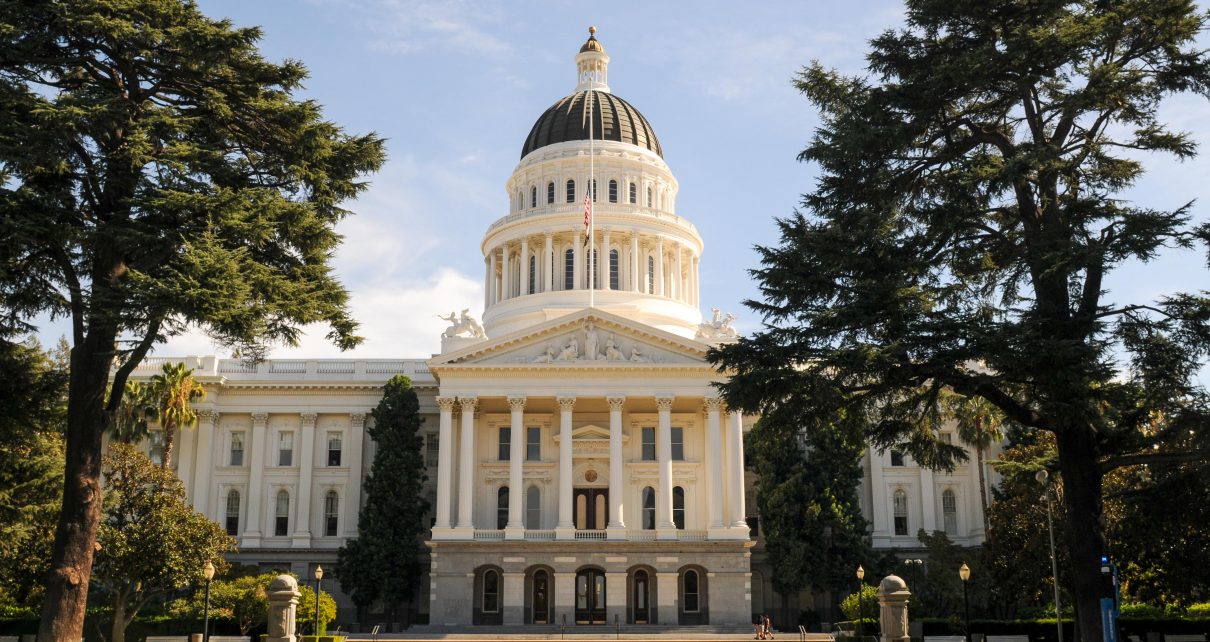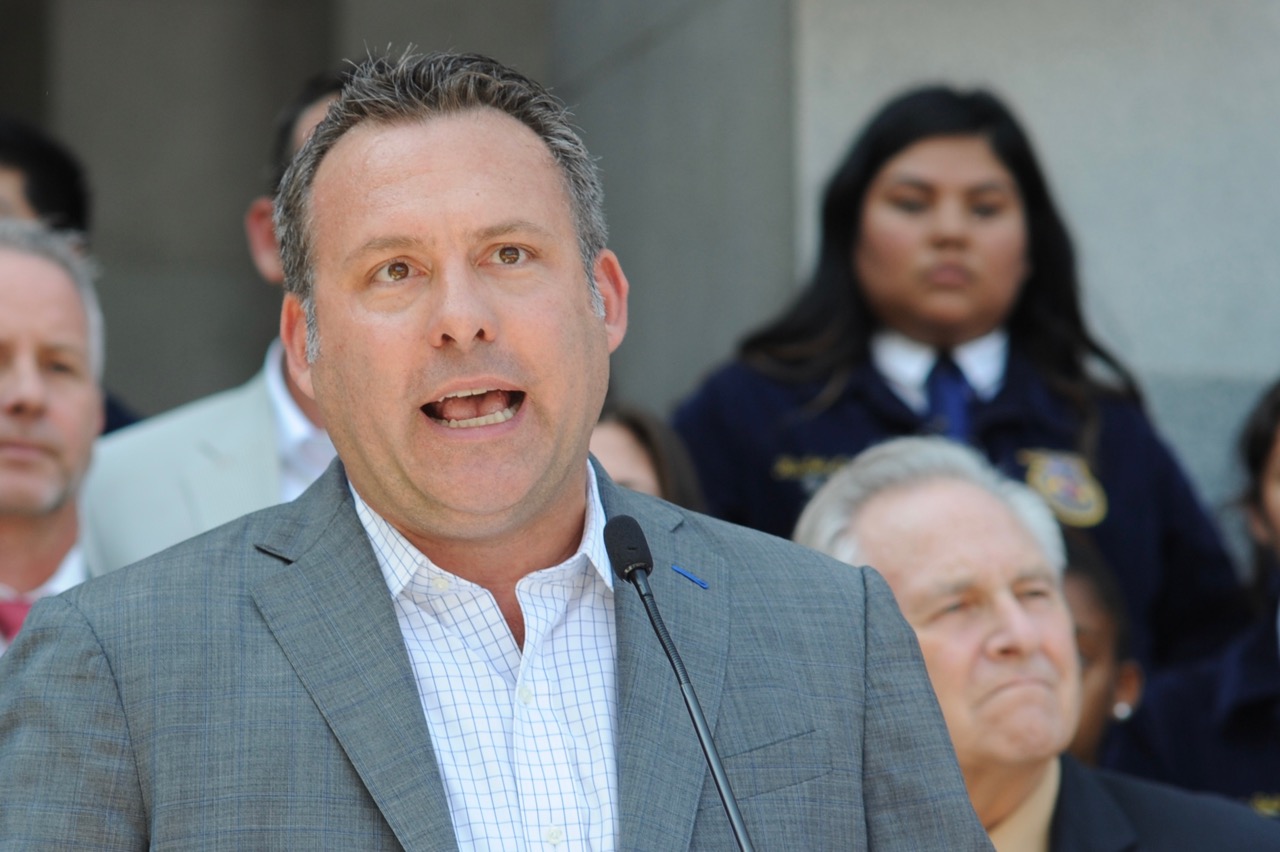
California State Capitol. (Photo: Kevin Sanders for California Globe)
CA Globe Analysis: Third Sports Wagering Measure Submitted to the AG
This measure would be known and cited as the ‘California Solutions to Homelessness and Mental Health Support Act’
By Chris Micheli, November 3, 2021 3:08 pm
The proponents of a third proposed ballot measure to offer sports wagering in California submitted an amended version of their initiative for preparation of a title and summary by the Attorney General. The following is a summary of this ballot measure.
Section 1 – Title.
This measure would be known and cited as the “California Solutions to Homelessness and Mental Health Support Act.”
Section 2 – Statement of Intent and Purposes.
This measure would provide ten findings and declarations, including that:
- California’s homelessness and mental health crises demand action.
- Mental health disorders are among the most common health conditions faced by Californians.
- In May 2018, the United States Supreme Court eliminated the federal prohibition on sports betting.
- Unregulated and untaxed online sports betting is currently happening throughout California in the illegal market without any consumer or responsible gaming protections.
- Allowing state-regulated entities to offer responsible online sports betting that includes a comprehensive licensing process.
- Safe, legal online sports betting that allows people who are 21 years or older to enjoy sports betting over the Internet and on mobile devices should require online sports betting operators to put in place age verification and information-sharing technologies.
- Safe and legal online sports betting should be regulated by the California Department of Justice.
- Online sports betting requires the expertise of entities with significant experience operating online sports betting platforms in other U.S. states and territories.
- The legal market for online and in-person sports betting must be operated by persons and entities with the ability to protect consumers.
- Online and in-person sports betting are complementary and supplementary to each other.
Section 3 – Section 19.5 Would Be Added to Article IV of the California Constitution.
First, a gaming tribe, an online sports betting platform provider with an operating agreement with a gaming tribe, or a qualified gaming entity with a market access agreement with a gaming tribe may offer, conduct, or operate online sports betting over the Internet and on mobile devices to persons aged 21 years or older physically present anywhere in this State, but outside of Indian lands of a federally recognized Indian tribe.
Second, online sports betting can only be offered, conducted, or operated in this State, but outside of Indian lands, as set forth in new sections of the Business and Professions Code.
Third, online sports betting would not be permitted on youth sports events.
Fourth, the taxes imposed by the Business and Professions Code is in lieu of and preempts all other existing or future state and local taxes.
Section 4 – Chapter 4.7 (commencing with Section 19750) Would Be Added to Division 8 of the Business and Professions Code.
Chapter 4.7 would be titled “Online Sports Betting.”
Article 1 would create the “California Online Sports Betting Trust Fund” and establish it in the State Treasury. 85% of the trust funds would be appropriated to the California Solutions to Homelessness and Mental Health Support Account, which would be created in the Fund and used for the purpose of delivering permanent and interim housing, including rental assistance, supportive services, and operating subsidies or reserves for these purposes.
Monies would be made available to cities, counties, and continuums of care according to the same allocation formula for the most recent fiscal year used to distribute moneys to those entities under the Homelessness Housing, Assistance, and Prevention program. A portion of the moneys in the account may also be appropriated for mental health treatment programs.
15% of the trust funds would be appropriated to the Tribal Economic Development Account.
Section 19751 would provide the California Online Sports Betting Trust Fund Oversight and Accountability. The AG and local district attorney would be required to expeditiously investigate, and may seek civil or criminal penalties for, any misuse or unauthorized use, of moneys deposited into, or appropriated from, the California Online Sports Betting Trust Fund or any account within the Fund. In addition, the California State Auditor would be required to conduct a biennial independent financial audit of the programs receiving moneys from the Fund.
Section 19751.5 would create the Tribal Economic Development Account in the California Online Sports Betting Trust Fund. These monies would be continuously appropriated to federally recognized Indian tribes in California that do not have a tribal operator license, an operating agreement with an online sports betting platform provider, or a market access agreement with a qualified gaming entity.
Article 2 would be titled “Protection of Minors and Consumers.” Section 19752 would prohibit those under 21 years of age from engaging in online sports betting.
Section 19753 would create consumer protections and requirements and require an online sports betting operator to use commercially reasonable efforts to verify that a person placing, making, or initiating a bet on a sporting event is of the legal minimum age for placing such a bet.
Section 19754 would impose voluntary restrictions on betting activity so that an online sports betting operator would be required to allow individuals to voluntarily exclude themselves from placing bets with the operator, and use commercially reasonable efforts to prevent self-excluded individuals from placing bets.
Section 19755 would specify requirements for online sports betting operator advertisements, and that operators must use commercially and technologically reasonable means to ensure marketing and advertisements do not purposefully target individuals who have self-excluded from placing bets on sporting events.
Section 19756 would regulate the conduct of online sports betting. Each online sports betting operator would be required to adopt house rules for game play governing online sports betting transactions with its customers. The rules would have to include specified items.
Section 19757 would specify risk management procedures and allow an online sports betting operator that is licensed to offer sports betting, whether in-person or online, in this State and one or more other U.S. states or territories may pool liquidity from all such states and territories.
Article 3 would be titled “Protection of Sports Integrity.” Section 19758 would be to maintain the integrity of sporting events. An online sports betting operator would be required to employ commercially reasonable methods to prohibit specified activities from taking place.
Section 19759 would set forth abnormal betting and other suspicious activity. The AG would have primary responsibility for conducting, or assisting DOSBC in conducting, investigations into abnormal betting activity, match fixing, and other conduct that corrupts a betting outcome of a sporting event or events for purposes of financial gain.
Section 19759.5 would set forth restrictions on betting requested by sports governing bodies so that a sports governing body may submit to DOSBC a written request, in a form prescribed by the Division, to restrict, limit, or exclude a certain type, form, or category of online sports betting with respect to a covered sporting event of the sports governing body, if the sports governing body believes that such type, form, or category of online sports betting with respect to the covered sporting event of the sports governing body may undermine the integrity or perceived integrity of such body or covered sporting events of such body.
Section 19760 would require a recording of bets so that online sports betting operators would have to maintain records of all bets placed, including personally identifiable information of the bettor, amount and type of bet, time the bet was placed, location of the bet, including IP address if applicable, the outcome of the bet, and records of abnormal betting activity for three years after the sporting event occurs.
Section 19761 would specify permissible online sports betting types and events. DOSBC would be required to maintain in real time a publicly accessible list of sports events, sports leagues, and bet types that are authorized for online sports betting pursuant to this chapter. An online sports betting operator would be allowed to accept bets on sports events, sports leagues, and bet types appearing on the list. An online sports betting operator would be allowed to submit a written request to DOSHBC seeking additional sporting events, sports leagues, or bet types to be added to the list maintained pursuant to this section.
Article 4 would be titled “Online Sports Betting Operators.” Section 19762 would authorize online sports betting in the State of California. Online sports betting would only be offered, conducted, or operated in this State pursuant to an online sports betting operator license issued by DOSBC to a gaming tribe, an online sports betting platform provider with an operating agreement with a gaming tribe, or a qualified gaming entity with a market access agreement with a gaming tribe.
Section 19763 would provide for online sports betting operator licenses and require a license to be obtained by each online sports betting operator as provided in this chapter. Licenses may be obtained by a gaming tribe, qualified gaming entity, or online sports betting platform provider. An application fee of $150,000 must be submitted to DOSBC. It would specify requirements to be met including adequate capitalization, history of material noncompliance, etc. An initial fee of $10 million would be required for a tribal operator license or an online sports betting platform provider operator. An initial fee of $100 million would be required for a qualified gaming entity operator license.
Section 19764 would provide for temporary online sports betting operator licenses to any operator applicant if specified conditions are met.
Section 19765 would require test the DOSBC to impose a testing requirement for online sports betting platforms.
Section 19766 would provide for the renewal of online sports betting operator licenses and require DOSBC to establish a process for an online sports betting operator to renew its license consistent with this section.
Section 19767 would specify documentation requirements related to gaming tribes, including a copy of an agreement between the license holder and a gaming tribe.
Section 19768 would provide for the processing of online sports betting operator applications, including their confidentiality and how criminal background checks would be conducted.
Article 5 would be titled “State of California Jurisdiction Over Online Sports Betting.” Section 19769 would provide that jurisdiction over online sports betting is retained by the State of California and that DOSBC would be required to condition the issuance, maintenance, and renewal of every tribal operator license upon the gaming tribe irrevocably consenting specified requirements.
Section 19770 would impose a limitation on state jurisdiction over gaming tribes. This chapter does not extend State of California jurisdiction to the making or placing of bets by persons who are physically present on Indian lands at the time a bet is made or initiated. In addition, this chapter does not create or extend any State of California jurisdiction or regulatory authority over any other gaming operations of a federally recognized Indian tribe.
Article 6 would be titled “Online Sports Betting Suppliers.” Section 19771 would set forth requirements for online sports betting suppliers to obtain a license, including a $25,000 application fee. Once approved, the supplier must pay an initial license fee of $100,000 for a 5-year license.
Section 19772 would establish a temporary online sports betting supplier license for those who have been licensed or similarly authorized to provide substantially the same services for online sports betting in at least two other U.S. states or territories. The temporary license would expire in two years.
Section 19773 would provide for the renewal of online sports betting supplier licenses and require the Division to establish a process for suppliers to renew their licenses, including a $10,000 renewal application fee. Upon renewal, a $50,000 license fee must be paid.
Article 7 would be titled “Online Sports Betting Key Persons.” Section 19774 would provide for key person licenses and the Division may require a key person of an online sports betting operator, operator applicant, online sports betting supplier, or supplier applicant to submit an application and obtain a license. A temporary license would have to be issued if the person holds a comparable license or similar authorization issued by another U.S. state or territory where online sports betting is legal. An application fee of $2,400 must be paid. A license fee of $750 must be paid upon a 5-year license being issued.
Article 8 would be titled “Online Sports Betting Surcharges.” Section 19775 would provide an online sports betting operator surcharge of 10% of the online sports betting operator’s adjusted gross online sports betting receipts derived from the offering, conduct, and/or operation of online sports betting in this State. The accrual method of accounting must be used, and monthly installment payments can be made. This section sets forth how the adjusted gross online sports betting receipts is calculated each month.
Section 19776 provides a surcharge on bets made through illegal or tax-exempt online sports betting platforms. This tax is imposed on the bettor for the privilege of placing or making, while physically present in this State but outside of Indian lands, a bet on or through an illegal or tax-exempt online sports betting platform. The tax would be 15% of the dollar amount bet on or through the illegal or tax-exempt online sports betting platform. The Division may adopt regulations or take actions to implement and enforce this section of law. There would also be a civil penalty of $1,000 per day that any tax owed is past due.
Article 9 would be titled “Division of Online Sports Betting Control.” Section 19777 would establish the Division of Online Sports Betting Control (DOSBC) within the Department of Justice. The AG would appoint a director of the DOSBC.
Section 19778 would set forth the powers of the DOSBC and vest it with exclusive power, authority, and jurisdiction to implement and enforce this chapter and supervise the offering, conduct, and/or operation of online sports betting in the State of California but outside of Indian lands.
Section 19779 would delegate all power necessary to carry out the administrative and executive functions of the Division to the Director.
Section 19780 would require confidentiality and the DOSBC to maintain a file of all applications for licenses under this this law.
Section 19781 would provide fines and penalties for violations of this law and allow the DOSBC to impose fines, place licensees on probation, and revoke licenses in response to violations of this chapter, subject to due process. This section would provide maximum amounts of fines for operators, suppliers, key persons, and all other persons.
Section 19782 would require the DOSBC to adopt emergency regulations sufficient to permit online sports betting to be offered, conducted, and/or operated in this State but outside of Indian lands.
Section 19783 would require reporting of violations to the DOSBC.
Section 19784 would provide the DOSBC with a start-up loan of $30 million from the General Fund to the AG to establish the DOSBC and would require the loan to be repaid within five years.
Article 10 would be titled “Online Sports Betting Independent Advisory Committee.” Section 19785 would establish the Online Sports Betting Independent Advisory Committee.
Section 19786 would specify the composition of the committee including the appointing authorities (most of the constitutional officers and the Legislature) for its 17 members.
Section 19787 would provide for committee members’ terms of office, which would be staggered
Section 19788 would provide the duties of the committee including that it must advise and make recommendations to the DOSBC and Director with respect to implementing this chapter.
Section 19789 would provide that each committee member would be paid $150 per diem, capped at 40 days per year.
Article 11 would be titled “Amendment, Effective Date, and Commencement of Online Sports Betting.” Section 19790 would provide that the Legislature may amend this chapter by a statute passed in each house of the Legislature by rollcall vote entered into the journal, five-sixths of the membership concurring, provided that the statute is consistent with, and furthers the purpose of, this chapter, but the Legislature may amend the percentage allocation of monies in specified accounts by rollcall vote entered into the journal, two-thirds of the membership concurring.
Section 19791 would provide that this law would take effect on the next January 1 following its approval by the voters. There would also be specified deadlines for initial appointments to the committee, publication and adoption of emergency regulations, the acceptance of license applications, and permitting online sports betting operators to conduct betting in this state.
Article 12 would be titled “Trade Secrets and Personal and Proprietary Information.” Section 19792 would specify that all submissions to DOSBC and all materials that contain proprietary information, trade secrets, financial information, or personal information about any person or entity are not public records subject to disclosure.
Section 19793 would require the collection, use, retention, and sharing of personal information to be governed by this chapter and not any other state law.
Article 13 would be titled “Definitions.” Section 19794 would provide definitions for the following terms: “adjusted gross online sports betting receipts”; “amateur sports event”; “collegiate sports event”; “committee”; “competitive event”; “novelty event”; “covered sports event”; “department”; “division”; “director”; “electronic sports event”; “fund”; “gaming tribe”; “handle”; “hold”; “Indian lands”; “key person”; “market access agreement”; “motor sports event”; “online sports betting”; “online sports betting operator”; “online sports betting operator license”; “online sports betting platform”; “online sports betting platform provider”; “online sports betting platform provider application”; “online sports betting platform provider license”; “online sports betting supplier”; “operating agreement”; “operator applicant”; “patron”; “bettor”; “consumer”; “customer”; “person”; “principal owner”; “professional sports event”; “qualified gaming entity”; “qualified gaming entity application”; “qualified gaming entity operator license”; “tribal application”; “tribal operator license”; “sports event”; “sports governing body”; “sports league”; “supplier applicant”; “total gross receipts”; “U.S. state or territory”; “bet”; “wager”; and “youth sports event.”
Section 5 – Section 15.5 Would Be Added to Article XIII B of the California Constitution.
This new section would provide that “appropriations subject to limitation” of each entity of government would not include appropriations of revenues from the California Online Sports Betting Trust Fund created by the California Solutions to Homelessness and Mental Health Support Act, or any other revenues deposited into any other fund or account pursuant to that Act.
Section 6 – Section 23.5 Would Be Added to Article XVI of the California Constitution.
This new section would provide that the taxes imposed by the California Solutions to Homelessness and Mental Health Support Act and the revenue derived therefrom, including investment interest, would not be considered General Fund revenues.
Section 7 – Severability.
This section would provide that the provisions of this Act are severable.
Section 8 – Conflicting and Non-Conflicting Initiative Measures.
This section would provide that any other initiatives authorizing sports betting to be offered over the Internet and on mobile devices to persons aged 21 years or older physically present in this State but outside of Indian lands are in conflict if they appear on the same statewide election ballot.
However, this initiative measure would not be deemed to be in conflict with the California Sports Wagering Regulation and Unlawful Gambling Enforcement Act, which was initially designated as Initiative No. 19-0029 Amendment #1 by the Attorney General and # 1886 by the Secretary of State.
This section also includes declarations that this Act and the California Sports Wagering Regulation and Unlawful Gambling Enforcement Act are complementary and supplementary to each other and that both would be given full effect if they are both enacted by the voters.
Section 9 – Liberal Construction.
This section would provide that this Act should be liberally construed to give effect to its intent and purposes.
Section 10 – Legal Defense.
This section would provide that, if this Act is subject to a legal challenge which attempts to limit the scope or application of this Act in any way, or alleges this Act violates any state or federal law in whole or in part, and both the Governor and Attorney General refuse to defend this Act to the fullest extent possible on behalf of the State of California, then specified actions are to be taken.
Once a title and summary are provided for this measure, then its proponents can pursue the collection of signatures to try and get the initiative on the November 2022 ballot.
- Committee Versus Floor Lobbying - March 1, 2026
- Fishing Traps in California - March 1, 2026
- What Type of Lobbyist Do You Want to Be? - February 28, 2026




